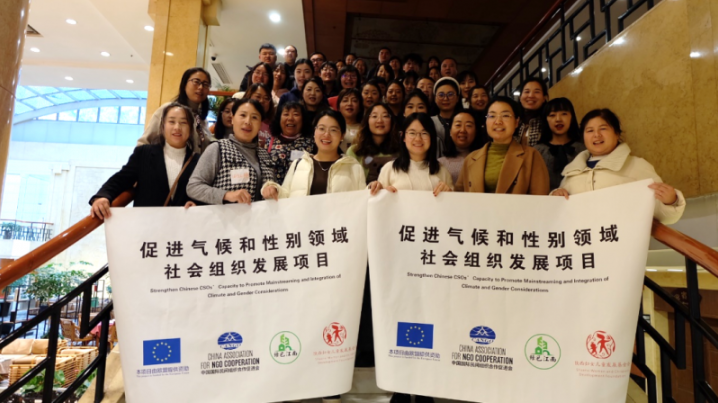
Group photo of participating delegates
Gender mainstreaming is translated from gender mainstreaming. Gender mainstreaming was adopted as a global strategy for improving gender equality in the Platform for Action of the Fourth World Conference on Women in Beijing in 1995, and was defined by the United Nations Economic and Social Council in 1997 as an analysis of the impact on women and men of all planned actions (including legislation, policies or project plans) in all areas and at all levels.
Equality between men and women is a basic national policy of our country, and it is a long-term and fundamental policy of our country to promote the synchronized development of women and the economy and society, the equal and coordinated development of men and women, and the all-round development of women themselves.
In order to improve the capacity of social organizations in gender mainstreaming, the first phase of gender mainstreaming training of the project on promoting the development of social organizations in the field of climate and gender was held in Xi'an from 9 to 12 January 2024. More than 30 representatives of social organizations from three provinces (regions), namely Shaanxi, Gansu and Ningxia, participated in the meeting.
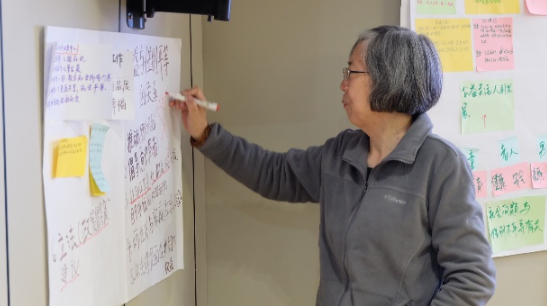
Gao Xiaoxian, former deputy inspector of the Shaanxi Provincial Women's Federation, founder of the Shaanxi Women's Theory Marriage and Family Research Society and the Shaanxi Women's Source Exchange Gender Development Center, conducted training for the representatives of the trainees.
The training began with an introduction by Gao Xiaoxian, former deputy inspector of the Shaanxi Women's Federation, founder of the Shaanxi Women's Theory Marriage and Family Research Association and the Shaanxi Women's Source Exchange Gender Development Center, on the basic concepts and practical significance of gender mainstreaming and its relationship with China's basic national policy of equality between men and women. Gao Xiaoxian gave a full introduction to gender mainstreaming from the international background and evolution of its occurrence, as well as the significance of gender mainstreaming to social and economic development, and combined with the United Nations' theories on the practice of development and sustainable development, as well as the Fourth World Women's Conference and other important backgrounds related to gender equality and women's development, as well as the historical process of equality between men and women and women's development in our country after the liberation, and gradually argued that The basic national policy of equality between men and women is both the core connotation of gender mainstreaming in China. During the training, Gao Xiaoxian also discussed with the participants the significance of gender mainstreaming in public welfare projects: to effectively enhance the effectiveness of the projects, and briefly introduced the methodology of gender mainstreaming in public welfare projects.
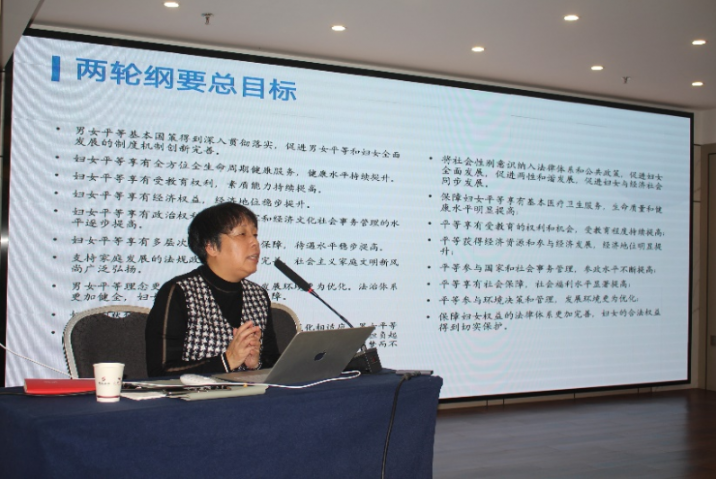
Content sharing by Yang Hongjuan, head of the expert group drafting the Shaanxi Women's Development Plan (2021-2030) and researcher at the Shaanxi Academy of Social Sciences
Subsequently, Yang Hongjuan, head of the expert group drafting the Shaanxi Provincial Women's Development Plan (2021-2030) and a researcher at the Shaanxi Provincial Academy of Social Sciences, re-emphasized the basic relationship between gender mainstreaming and China's basic national policy on gender equality as complementary and integrated, from the indicators of gender equality at home and abroad, and the specific connotations of the basic national policy on gender equality, and further explained the specific goals and targets of China's Outline for the Development of Women, introducing the paths, methods and monitoring system of China's current implementation of the Outline for the Development of Women. It also further explained in depth the specific goals and targets of the Outline for the Development of Chinese Women, and introduced China's current paths, methods, and monitoring system for the implementation of the Outline for the Development of Chinese Women, so that participants could have a more comprehensive understanding of the specific methods and targets used by the government to implement the basic national policy of equality between men and women through the Outline for the Development of Chinese Women, and thus be better able to implement gender mainstreaming in public welfare organizations and public welfare projects.
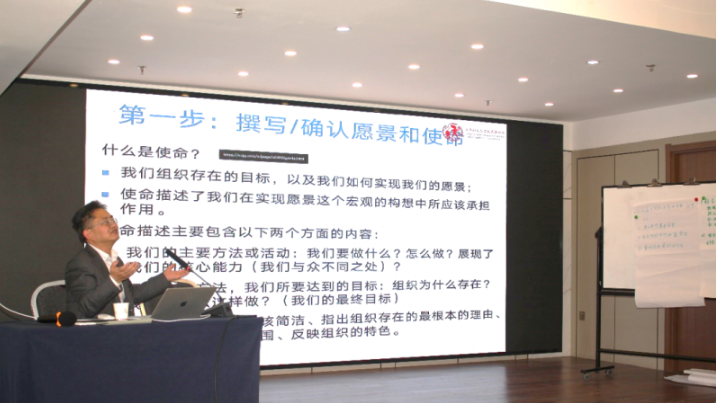
Liu Kehui, Secretary General of Shaanxi Women and Children Development Foundation, shared content related to the development of strategic planning by the organization
Liu Kehui, Secretary General of Shaanxi Women and Children Development Foundation, briefly introduced the background and steps of strategic planning, focusing on the methodology and importance of setting out clear, specific and measurable annual/project goals, and expressed the hope that, in the reality of the rapidly changing and developing environment of technology, policy and environment, although each organization can decide according to its own situation whether it needs to spend more energy on developing a "strategic planning with a gender perspective", but any organization should think strategically in its development. A checklist for strategic planning with a gender perspective, developed by the Shaanxi Foundation for the Development of Women and Children, was also shared for the reference of organizations in need.

Ailing Li, head of Shaanxi Jiayi Women's Development Center, and Yang Hui, researcher at the Xi'an Academy of Social Sciences, conducted women's leadership training for the participants.
Yang Hui, a researcher at the Xi'an Academy of Social Sciences with more than 30 years of experience in women's development research and training, and Li Ailing, the head of the Shaanxi Jiayi Women's Development Center, who has long been engaged in women's development projects and women's leadership training, discussed the concepts of leadership, how to improve leadership, and the difficulties and challenges faced by women leaders with women leaders in social organizations through the participatory learning methodology. In addition, through the two ways of thinking of "problem-based" and "strengths-based", she guided the members of social organizations to use the "meritocracy" method to change their traditional thinking through the performance of a group drama. Through the group drama, the members of the social organization were guided to use the "meritocracy" method to change their traditional thinking, integrate resources, build relationships, and enhance the influence of the organization.
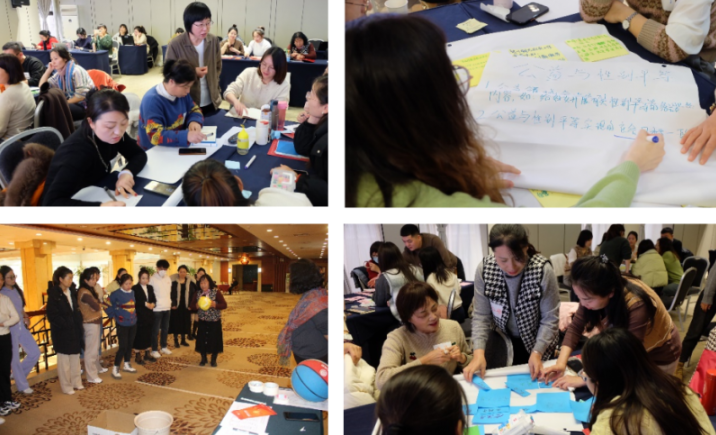
Pictures of the training site
At the end of the training, representatives of the participating social organizations visited the Shaanxi Women's Genway Gender Development Center and Shaanxi Shangshan Public Welfare Development Center, as well as the Evergreen Ivy Social Work Service Center in Weiyang District, Xi'an City, and the Xi'an City Lianzhongli Social Work Development Center in small groups, so as to gain a deeper understanding of the practices and experiences of the social organizations of Shaanxi Province in the areas of gender mainstreaming, the development of institutional strategic planning, and women's leadership.
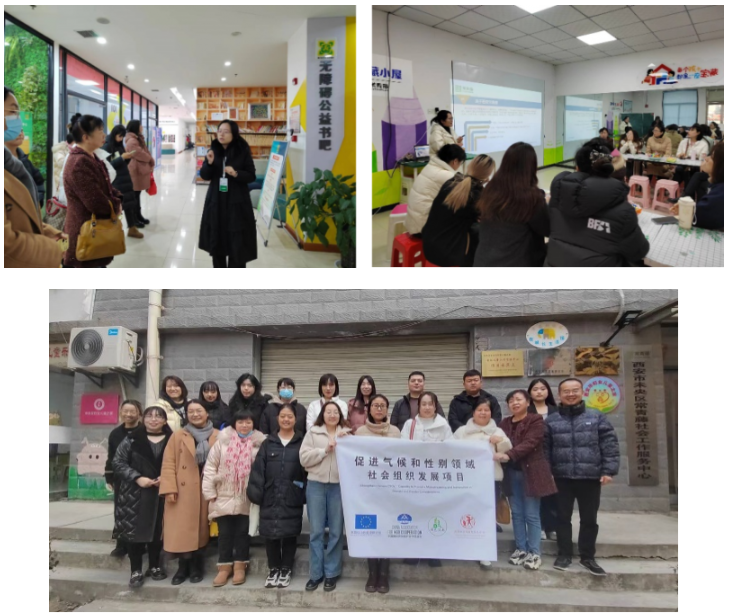
Pictured are visits to Xi'an Lianzhongli Social Work Development Center and Xi'an Weiyang District Ivy Social Work Service Center
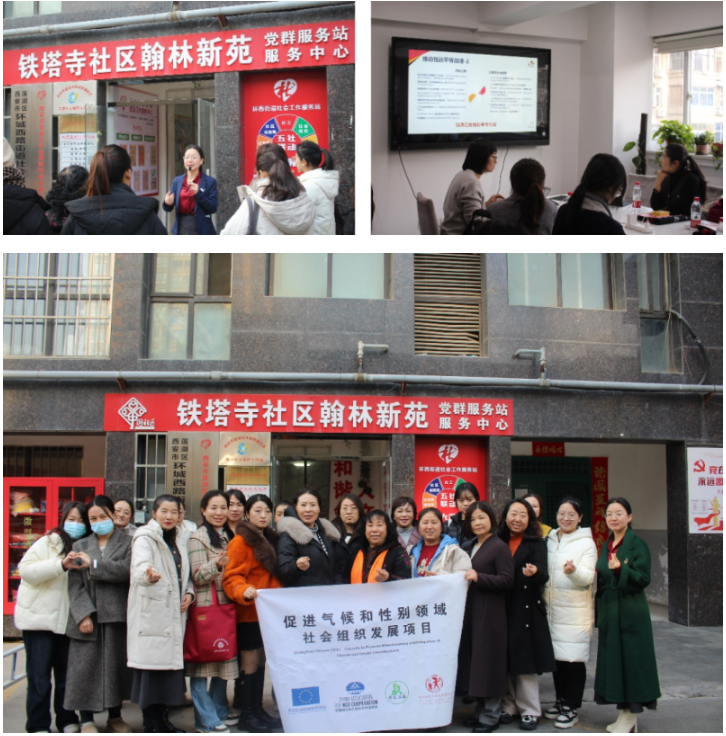
Pictured are the visits to Shaanxi Shangshan Public Welfare Development Center and Shaanxi Women's Resources Exchange Gender Development Center
This training is the first training under the project, and will be followed up by training workshops on issue capacity enhancement, institutional development capacity enhancement and issue integration for social organizations in the climate and gender fields.
Background: The project "Promoting the Development of Social Organizations in the Field of Climate and Gender Issues" is funded by the European Union and implemented by the China Association for the Promotion of International Cooperation among Civil Society Organizations in cooperation with the SIP Lvse Jiangnan Public Environment Concerned Centre (PECC) and the Shaanxi Women and Children Development Foundation (SWCF). The project aims to strengthen the professionalism of social organizations on climate and gender issues and enhance their institutional development capacity by providing capacity-building and resource support.
